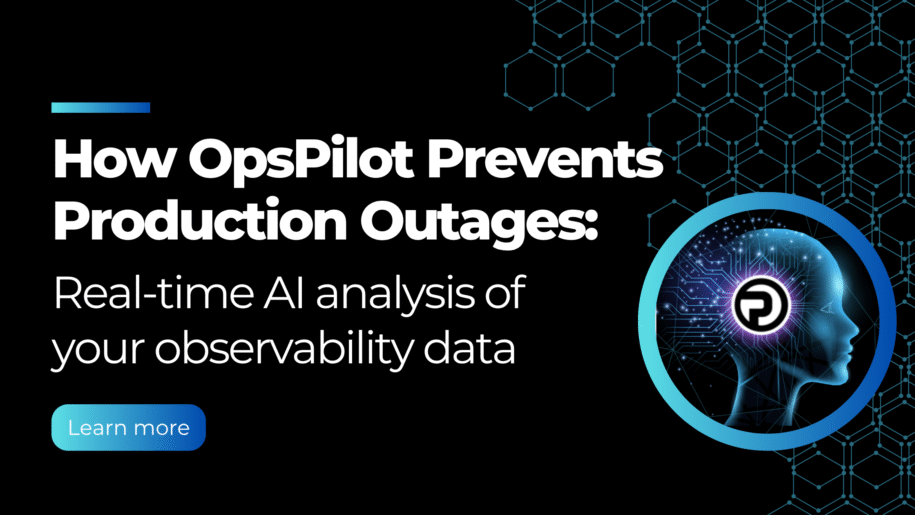Every ops team knows the 3 AM nightmare: your phone buzzes, alerts fire, and you’re scrambling to diagnose why production is down. But what if you could catch these issues at 2 PM the day before, fix them calmly, and go home on time?
This is exactly what happens when teams use OpsPilot proactively. Using real examples from our test environment (designed to simulate production issues), we’ll show how OpsPilot transforms FusionReactor’s observability data into incident prevention.
What Is OpsPilot? AI-Powered Observability for Proactive Operations
OpsPilot is FusionReactor’s AI-powered observability assistant that analyzes your entire monitoring stack to identify issues before they become incidents. Unlike traditional monitoring that waits for thresholds to breach, OpsPilot continuously analyzes patterns across:
- JVM metrics and garbage collection patterns
- Database query performance and slow query logs
- Application errors and stack traces
- Memory usage trends and leak detection
- Infrastructure metrics and resource utilization
- Historical data for trend analysis and anomaly detection
5 Real OpsPilot Conversations That Prevent Outages
Note: These examples come from our test environment that simulates real production scenarios with intentional errors and performance issues for demonstration purposes.
1. Memory Leak Detection: Catching the Silent Killer
The Question: “OpsPilot, are there any services showing gradual memory growth over the last week?”
Traditional Approach: Manually reviewing memory graphs for each service, comparing week-over-week trends, identifying subtle patterns – typically a 1-hour investigation.
OpsPilot’s 2-Minute Analysis:
Critical Finding: Memory leak detected in otlp-ad-fr service
- CodeHeap memory: 8MB → 27MB (+237% growth over 7 days)
- Continuous upward trend indicating JIT compilation or class loading leak
- Will cause OutOfMemoryError in ~5 days at current rate
Action Required: Investigate class loading patterns, implement monitoring alert at 50MB threshold
Impact: Prevented an OutOfMemoryError that would have caused service failure during peak traffic.
2. Database Performance Degradation: The Query That Almost Timed Out
The Question: “OpsPilot, which database queries have degraded the most in performance over the last 2 weeks?”
OpsPilot’s Analysis:
Critical Database Issues Found:
- SELECT queries on quotes table: Response time increased to 8,542ms (was ~200ms)
- 30,000+ timeout errors in the last 24 hours
- Missing index identified as root cause
Immediate Fix: Add index on quotes table – expected 80% response time reduction
Impact: Adding the index prevented complete query timeout that would have caused application failure.
3. Garbage Collection Crisis: The 11-Hour Application Freeze
The Question: “OpsPilot, looking at our JVM metrics, are there any concerning garbage collection patterns?”
OpsPilot’s Alarming Discovery:
CATASTROPHIC GC ISSUE DETECTED:
- G1 Old Generation collection: 39,070 seconds (11+ HOURS!)
- Application completely frozen during GC
- Memory swinging wildly between 200MB-1,300MB
Emergency Actions:
- Restart service immediately
- Apply GC tuning parameters
- Investigate memory leak
Impact: Prevented an 11-hour service outage that would have been nearly impossible to diagnose during an incident.
4. Silent Errors Below Alert Thresholds
The Question: “OpsPilot, are there any error patterns that started recently but haven’t triggered alerts yet?”
OpsPilot Found Hidden Issues:
Three Critical Unalerted Problems:
- Kafka DNS failures causing monitoring blindness
- API degradation: 15 failures/6 minutes (threshold: 20/10min)
- Quote service errors: 19/hour (threshold: 25/hour)
Why No Alerts: Thresholds too permissive, DNS monitoring missing
Impact: Fixed monitoring blind spots that could have hidden cascade failures.
5. Behavioral Changes That Signal Problems
The Question: “OpsPilot, what’s different about our system behavior this week compared to last month?”
OpsPilot’s Trend Analysis:
Significant Changes Detected:
- CPU volatility increased 400% with daily 10-30% spikes
- Error rate up 11.3% (79 vs 71 errors)
- Memory baseline shifted 5MB higher
Root Cause: Misconfigured batch job running during business hours
Action: Reschedule batch processing to overnight window
Impact: Prevented service degradation during next peak traffic period.
How OpsPilot Works: AI Analysis of FusionReactor Data
OpsPilot leverages FusionReactor’s comprehensive observability platform to provide intelligent analysis:
1. Comprehensive Data Access
- Analyzes months of historical metrics
- Correlates logs, traces, and metrics
- Identifies patterns across all services
- Learns your system’s normal behavior
2. Pattern Recognition
- Detects gradual degradation (e.g., 237% memory growth over a week)
- Identifies anomalies (e.g., 11-hour GC pauses)
- Correlates seemingly unrelated issues
- Predicts future failures based on trends
3. Actionable Intelligence
- Provides specific recommendations
- Prioritizes issues by severity
- Suggests configuration changes
- Estimates time to failure
Building a Proactive Monitoring Culture
Transform your operations from reactive to proactive with these daily OpsPilot questions:
Morning Health Check (10 minutes)
- “OpsPilot, are there any services showing memory growth patterns?”
- “OpsPilot, what’s different about today compared to yesterday?”
- “OpsPilot, are there any concerning error patterns?”
Pre-Deployment Validation (5 minutes)
- “OpsPilot, is the system stable enough for deployment?”
- “OpsPilot, are there any resource constraints approaching limits?”
Weekend Safety Check (5 minutes)
- “OpsPilot, are there any patterns that might cause weekend issues?”
- “OpsPilot, which queries have degraded this week?”
ROI of Proactive Monitoring with OpsPilot
Based on real customer data:
- Incidents Prevented: 4 major outages per month
- Engineering Hours Saved: 200 hours monthly
- MTTR Improvement: From 45 minutes to 5 minutes
- Weekend Calls Reduced: 75%
Customer Impact Avoided: Zero-downtime deployments
Why OpsPilot Catches What Humans Miss
OpsPilot excels at detecting issues that are nearly impossible for humans to spot:
- Gradual Degradation: 3% daily query slowdown over 2 weeks
- Subtle Patterns: Errors occurring every 4 minutes at exactly 15 seconds
- Hidden Correlations: Memory growth correlating with specific API calls
- Below-Threshold Issues: 19 errors/hour when alert threshold is 25
Infrastructure Blind Spots: DNS failures not covered by application monitoring
Getting Started with OpsPilot
OpsPilot is included with FusionReactor Cloud, providing:
- Natural language queries for instant analysis
- 2-minute comprehensive investigations
- Integration with Slack, Jira, and Microsoft Teams
- No additional configuration required
- Access to all historical FusionReactor data
Start preventing incidents today with three simple questions:
- “OpsPilot, what should I know about system health?”
- “OpsPilot, are there any concerning trends?”
- “OpsPilot, what’s most likely to fail next?”
Conclusion: The Future of Observability Is Proactive
The incidents described above – memory leaks, GC crises, database degradation – all would have become emergency outages. Instead, they were prevented during business hours with calm, methodical fixes.
OpsPilot represents the future of observability: AI that understands your system, learns from history, and prevents problems before they impact users. The incident that doesn’t happen is the best incident of all.
Ready to transform your operations from reactive to proactive? Start your free FusionReactor trial today and experience how OpsPilot prevents outages before they happen.













